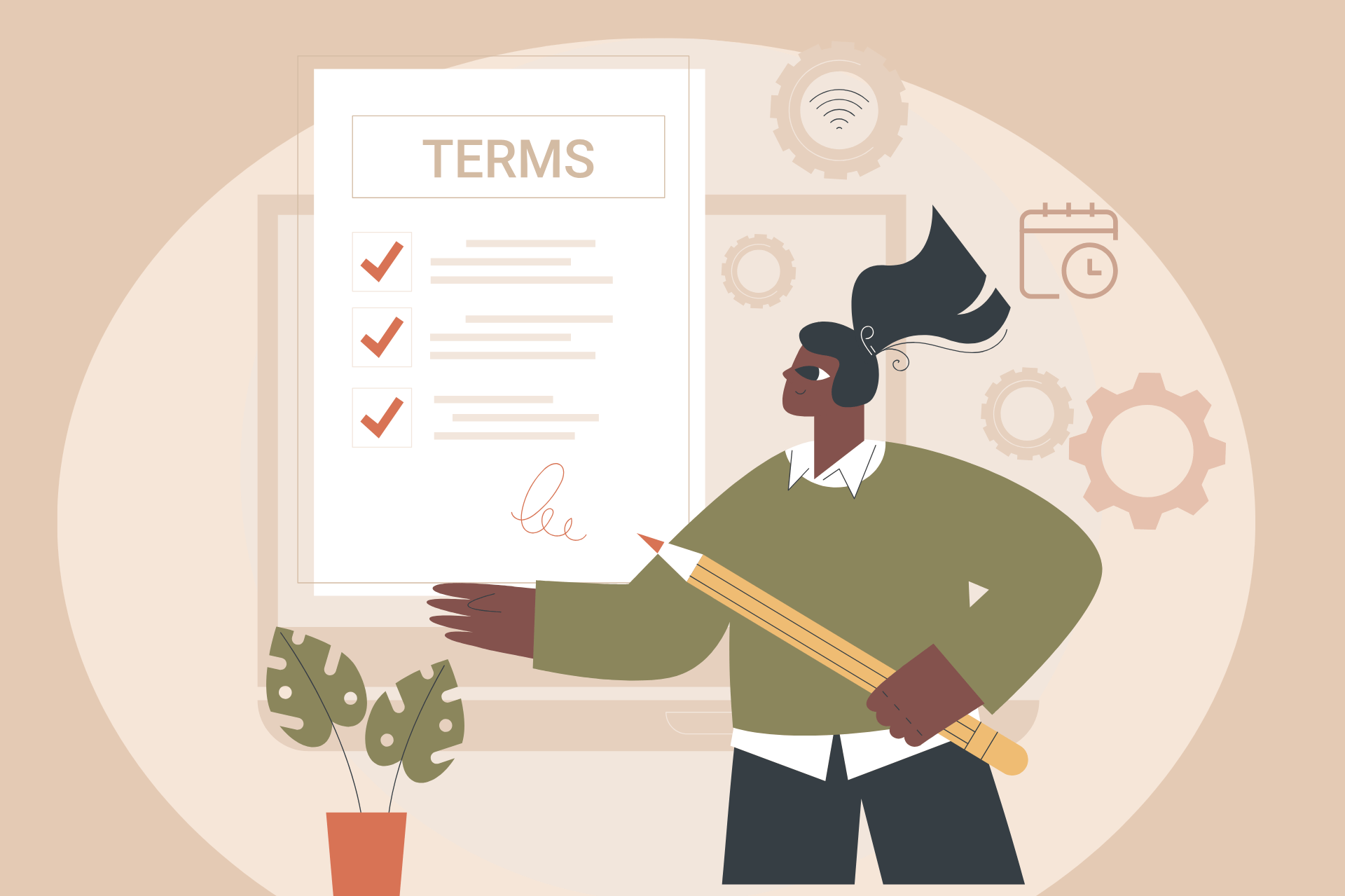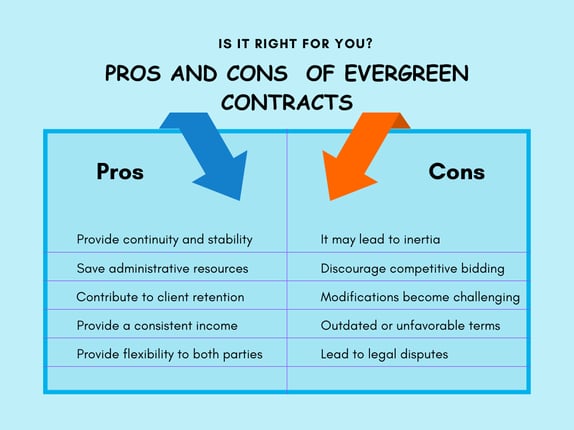
How To Navigate The Complexities Of An Evergreen Contract
Content
- What is an evergreen contract?
- Are evergreen contracts legally enforceable?
- When is an evergreen contract necessary?
- What is the difference between evergreen and perpetual contracts?
- What benefits and drawbacks come with Evergreen contracts?
- Benefits of Evergreen Contracts
- Drawbacks of Evergreen Contracts
- How to terminate evergreen contracts
- In short
One of the most crucial components of your contract is its term. Whether personal or business-related, the length of a contractual agreement dictates the relationship’s future. However, based on the requirements of the parties and the legal environment, the contract duration can vary greatly. They can decide how, when, and if they want to renew the terms of the contractual agreement. Evergreen clauses, or contracts, are one such option.
It’s a viable choice for businesses looking to continue the arrangement without renegotiating the terms or finding alternatives annually. Evergreen contracts can serve various business purposes, from rental agreements to long-term collaborations.
What is an evergreen contract?
Evergreen contracts automatically renew or extend indefinitely unless one of the parties involved takes action to terminate or modify the agreement. These contracts provide a continuous and ongoing relationship between the parties. It functions with the understanding that the terms and conditions will persist until either party decides to make a change.
These agreements remain in effect over time, barring contract breaches or other relevant issues. They often come in handy for various business arrangements, such as service agreements, subscription contracts, and certain lease agreements.
Here are some characteristics of evergreen contracts:
Automatic Renewal: The contract renews automatically for successive periods (e.g., monthly, annually) unless one of the parties gives notice to terminate or modify the agreement.
Continuous Relationship: Evergreen contracts are suitable for situations where businesses require ongoing relationships or services. It’s convenient for the parties to have the contract automatically renewed without the need for frequent renegotiations.
Termination Notice: Typically, there is a requirement for one or both parties to provide a notice period if they wish to terminate the contract. If there’s no notice, the contractual agreement will renew automatically.
Flexibility: Evergreen contracts provide flexibility for the parties involved, as they can continue the relationship without the need to negotiate and sign a new contract each time the term expires.
Are evergreen contracts legally enforceable?
Evergreen contracts and clauses are usually enforceable in court unless there are particular state laws specifying otherwise. The enforceability mainly depends on the specific terms and conditions and whether the contract meets certain legal requirements.
There might be differences in how various states handle evergreen contracts. For instance, New York, California, the District of Columbia, Florida, Georgia, Hawaii, Illinois, Louisiana, New Mexico, North Carolina, Oregon, Vermont, and Virginia have laws broadly regulating auto-renewal clauses. The court focuses on the following factors while determining the validity of sellers of goods and services using evergreen contracts with their consumers.
- The contract must have clear and conspicuous language stating the auto-renewal terms, cancellation policy, duration, and charges.
- The client must expressly consent to the contract before the initial charges for the services or product.
- Consumers must receive explicit notice acknowledging the automatic renewal terms, the applicable cancellation policy, and related charges.
When is an evergreen contract necessary?
Evergreen contracts and clauses are critical for businesses when continuity and convenience are a priority. They can reduce administrative burden by avoiding the need for frequent contract renegotiation, especially for routine or standardized services. Each business relationship is unique, so the decision to use evergreen contracts should depend on the specific needs, but here are some scenarios where they come in handy:
Ongoing Services or Maintenance:
When you’re providing or receiving services on an ongoing basis, such as maintenance services, subscription-based services, or software support, evergreen contracts are beneficial. These contractual agreements ensure that the relationship between the parties continues seamlessly without the need for frequent renegotiation or reissuing of contracts.
Supplier Relationships:
If you have a qualified vendor or supplier on your payroll, you should continue to use their services or products until they prove otherwise. In such cases, evergreen contracts help set up business-to-business relationships. They can specify the terms so that suppliers can provide essential goods or services continuously. This type of contract helps maintain a stable supply chain without regular contract renegotiations.
Subscription-Based Businesses:
Businesses that offer subscription-based products or services, such as streaming services, cloud storage, or software as a service (SaaS), often use evergreen contracts to provide ongoing access to their offerings. It can be a strategy for retaining clients over the long term. The automatic renewal feature can simplify the process for clients, making it more likely that they will continue the relationship.
Preventing Service Gaps:
In cases where a service interruption could be detrimental, such as with critical IT support or infrastructure services, evergreen contracts help prevent gaps in service provision. For businesses that rely on predictable revenue streams, evergreen contracts provide predictability by ensuring that existing contracts continue without interruption.
What is the difference between evergreen and perpetual contracts?
Evergreen and perpetual contracts refer to contracts that automatically renew or continue indefinitely unless one of the parties takes specific action to terminate them. As we have already discussed, evergreen contracts or clauses renew automatically after a specified term. The renewal implies the continuation of the existing terms and conditions. Evergreen contracts are a popular choice for ongoing services.
Perpetual contracts, on the other hand, do not always involve automatic renewal; instead, they may continue indefinitely without an end date. For instance, when a consumer purchases a license to use software, the agreement does not have an expiration date. Thus, the consumer can continue using the product or service perpetually. These contracts are more open-ended and may not have a specific mechanism for renewal but rather exist until one of the parties decides to terminate them.
What benefits and drawbacks come with Evergreen contracts?
When businesses need ongoing services or goods, evergreen contracts come in handy. They’re a convenient option for rental agreements, healthcare plans, product subscriptions, and so on. However, a company must carefully weigh the long-term effects of an evergreen contract before deciding to enter one. Here's an overview of the advantages and disadvantages:

Benefits of Evergreen Contracts
- Evergreen contracts provide continuity and stability for ongoing business relationships. It can be particularly beneficial for long-term projects or services where interruptions could be disruptive.
- Automatic renewal eliminates the need for frequent renegotiation or reissuing of contracts. It can save time and administrative resources for both parties.
- Evergreen contracts can contribute to client retention by simplifying the renewal process. Clients may appreciate the convenience and choose to continue the relationship.
- Evergreen contracts provide a predictable and consistent income stream for businesses that rely on recurring revenue, making financial planning more manageable.
- While the contract renews automatically, it often includes provisions for termination by mutual agreement or based on specific conditions, providing flexibility to both parties.
Drawbacks of Evergreen Contracts
- The automatic renewal feature may lead to inertia, where parties continue the relationship without regularly evaluating its effectiveness or exploring better alternatives.
- Evergreen contracts may discourage competitive bidding for services, as the automatic renewal may limit opportunities for other vendors or providers to compete for the business.
- Making changes to the terms of an evergreen contract, such as pricing adjustments or modifications to services, can be more challenging than in contracts with fixed terms.
- Over time, the terms of an evergreen contract may become outdated or unfavorable to one of the parties. Without regular renegotiation, one party may find itself locked into terms that are no longer in its best interest.
- Evergreen contracts may create a dependency on the existing relationship, making it harder for either party to explore new partnerships or adapt to changing business needs.
- If termination procedures are not clearly defined or if there are disagreements about the conditions for termination, evergreen contracts can lead to disputes and legal challenges.
How to terminate evergreen contracts
Mutual agreement forms the basis of evergreen contracts. However, either party may decide to end the relationship at some point. For instance, if you have a Netflix account with auto-renewal every month, the cancellation policy still allows you to cancel your subscription. Similarly, here's how you can legally terminate evergreen contracts:
Termination by Agreement
Mutual consent between the parties is the most straightforward way for an evergreen contract to end. If both parties agree to terminate the contract, they can do so by executing a termination agreement that outlines the terms and conditions of the termination. The contract may specify a notice period that either party must provide to terminate the agreement. This notice period allows both parties time to adjust to the termination and make alternative arrangements.
Termination by Default
If one party fails to fulfill its obligations under the evergreen contract, the other party may have the right to terminate it due to a breach. The contractual agreement must specify the breach and termination provisions.
Often, contracts include provisions that allow termination if there is a material breach, meaning a significant violation of the terms that go to the core of the contractual agreement.
Termination by Law
In some cases, events beyond the control of the parties (force majeure events) may make the performance of the contract impossible. Many contractual agreements include force majeure clauses that allow for termination or suspension of the contract under such circumstances. If there is a change in the law that makes the performance of the contract illegal or impractical, it may be terminated based on legal grounds.
Evergreen contracts should include specific details about how termination can occur, including any required notice periods, termination fees, or other relevant conditions. The parties must adhere to any procedural requirements specified in the contract to ensure termination is valid and enforceable.
In short
Evergreen contracts can be valuable tools for businesses to perpetuate continuity and stability and reduce administrative burdens. However, it’s essential to carefully craft these contracts, using explicit termination provisions, mechanisms for periodic evaluation and renegotiation, and flexibility to adapt to changing circumstances.
The automatic renewal feature can simplify ongoing relationships, providing a level of convenience for both parties. However, it’s critical to be aware of potential drawbacks, such as the risk of inertia, lack of competitive bidding, and difficulty making changes. In the end, it all depends on the individual business to make the most of evergreen contracts.
Book a Live demo
Schedule a live demo of Dock 365's Contract Management Software instantly.
.png?width=196&height=196&name=MicrosoftTeams-image%20(24).png)
Written by Deepti Gopimohan




